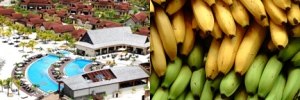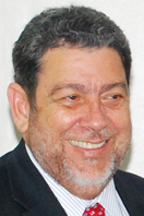
KINGSTOWN, St. Vincent – Vincentian education planners prior to 2001 failed to train nationals to respond to the demands of a changing economy, according to Prime Minister Dr. Ralph Gonsalves.
Gonsalves, delivering a lecture sponsored by the Community College last night, said that between 1992 and 2002, annual banana exports and earning fell from 80,000 and EC$120 million, respectively, to 22,000 tons and $30 million, according to a transcript of the lecture sent to the media.
On the other hand, annual tourism earnings rose from million in 1993 to $300 million in 2002,” said Gonsalves, whose Unity Labour Party (ULP) came to office in March 2001, ending 17 years of New Democratic Party (NDP) rule.
“Yet, the previous administration failed to prepare the population with the requisite education and skills for the modern, competitive, service-oriented, post-colonial economy and society,” said Gonsalves.
“The graduates from primary schools had fewer banana holes to dig, but they were not accorded secondary education or post-primary training to equip them for a different and transforming economy,” Gonsalves added.
“Education was not even keeping up with the economic changes much less being ahead or in the vanguard, of these structural, economic alterations. The education system, to a large degree, had become dysfunctional,” he said.
According to Gonsalves, in 2000, secondary school education was of “a gradually low quality and access to it was hugely restricted”.
Caribbean Examination Council (CXC) grades, especially in mathematics, the sciences, and English “were woeful,” he further stated.
He, however, acknowledged that performance in these subjects is “still not close to being good enough”.
He further said that in 2000, only 39 per cent of the nation’s 12-year-olds were at secondary school and that enrolment has increased by a mere 343 in the ten years before then.
Gonsalves further decried the poor conditions of the nation’s school, mentioning sub-standard laboratories, limited library facilities, overcrowding, “practically non-existent” access to Information Communications Technology (ICT) learning and computers, and inadequately trained teachers.
“… generally-speaking the schools and the facilities within them were run-down, neglected, and wholly inadequate,” Gonsalves said of the situation before his government came to office.

He further said “a similar tale of unacceptable educational inadequacy and insufficiency” existed in early childhood education, primary education, special education, technical and vocational education, post-secondary education, tertiary education, and adult and continuing education.
“In short, the educational system was ineffective to the point of dysfunctionality in meeting satisfactorily the challenges which necessarily arose from any reasonable package of articulated goals of education and training.
“At the core of this ineffectiveness and dysfunctionality was the disconnect between the altered production apparatuses and the competitive environment, on one hand, and education, on the other,” Gonsalves said.
He said the leaders of the pre-2001 administrations “were not unaware of the educational malaise around them, but they were unable to fashion an appropriate way out of the crisis to which they had contributed immensely”.
The Prime Ministers in 1994 and 2000 — the NDP’s Sir James Mitchell and Arnhim Eustace — Gonsalves said, “publicly bemoaned the presence of a crisis in education.
“Their thesis was identical: The nation was not receiving adequate returns on the educational investments and the teachers were to be blamed. They were unable to see that the absence of a well-conceived educational policy, strategy, and action plan was the central brake on educational advancement and that they were primarily responsible. The educational crisis was thus, at its root, political, philosophical, strategic, and programmatic in nature,” Gonsalves said.
The ULP’s “Education Revolution” has resulted in universal access to secondary education and greater numbers of Vincentians at tertiary institutions.

And Gonsalves said his government saw that an “Education Revolution was, and is required, to be the mid-wife, hand-maiden, servant, and leader of the emerging competitive post-colonial economy, of an evolving sophisticated society lodged within the framework of our Caribbean civilisation, and of a modern and deepening political democracy.
“A solid educational foundation has been laid through our Education Revolution. Now, it is necessary and desirable to take it to the next, higher level. This is fundamental for our further economic advancement, enhanced social progress, and political development,” he further stated.
Gonsalves, a former university lecturer the four functions of education and training “in our Caribbean and Vincentian contexts are to train critical minds fit to receive and transmit universal culture, to produce skilled workers; to inculcate a core of tried and tested values, and to shape well-rounded personalities and healthy beings for life, living, and production.
The former university lecturer spoke on the topic “Education and Independence in the Twenty-First Century”.
The lecture came one week after this country celebrated its 32nd anniversary of independence.





